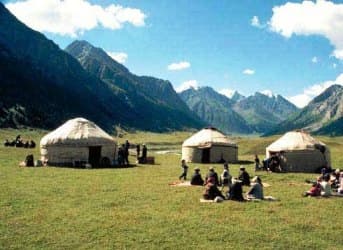Representatives from Russian energy company Gazprom met this week with Kazakh officials to discuss the natural gas potential in the region. Gazprom said delivering gas from Kazakhstan to members of the Commonwealth of Independent States topped the agenda. In nearby Turkmenistan, meanwhile, Western supporters of a $9 billion natural gas pipeline are pressing their case as part of a broader economic initiative for the region. Gazprom, through its joint venture in Kazakhstan, aims to exploit the 116 trillion cubic feet of estimated natural gas reserves there. With little international support of their own for the project in Turkmenistan, Western powers risk losing their grip on a once hotly-contested part of Central Asia.
Alexei Miller, the top executive at Gazprom, met Kazakh Oil and Gas Minister Sauat Mynbayev to discuss energy prospects there. Gazprom said one of the main areas of cooperation is the transit of natural gas supplies from the region to CIS consumers. Gazprom said there's an estimated116 trillion cubic feet of natural gas in the country, though that volume could reach as high as an estimated 282 trillion cubic feet. The Russian energy giant added that one of the main business activities of its joint venture there, KazRosGaz, was the international sale of natural gas. The country also holds about 3 percent of the world's recoverable oil reserves. Once production starts, companies there aim to deliver oil through existing pipeline networks in Russia and by ship through the Caspian and Black Seas and ultimately to Mediterranean ports.
Related Article: Despite Fukushima, China Embraces Nuclear Power
In terms of the broader geopolitical context, the region has played an integral role in geopolitical maneuvering among members of the European Union and Russia given the expectations from the Shah Deniz natural gas field in Azerbaijan's waters. Exxon Mobil and India's ONGC Videsh, meanwhile, have expressed interest in oil and natural gas blocks in the north of Afghanistan. In the 1990s, international investors were looking at Afghanistan as part of a broader Caspian strategy to thwart Soviet dominance of the regional energy sector. In the 1990s, Unocal, now a wholly-owned subsidiary of Chevron Corp., was in talks with the Taliban to build a natural gas pipeline from Turkmenistan through the Afghan north. That project, the Turkmenistan-Afghanistan-Pakistan-India pipeline, now enjoys the support of the Asian Development Bank. Robert Blake, U.S. assistant secretary of state for the region, said last month that pipelines like TAPI could help Central Asian economies break away from "something the Soviets capitalized on" when they pushed into the region.
Separate from conflict, however, is the reluctance of regional leaders to embrace foreign investors. The so-called road show for TAPI has generated little international support because the government in Turkmenistan isn't willing to give foreign companies like Exxon stakes in its oil and natural gas field. An analyst familiar with energy developments in the region told Oilprice, on condition of anonymity, however, that "a very good source" has indicated that China National Petroleum Corp. has expressed interest in TAPI. Beijing by June had secured roughly 1 trillion cubic feet of natural gas from Turkmenistan since deliveries began in late 2009. CNPC is already working on oil developments near the Turkmen border with Afghanistan and may have brokered, the analyst said, security guarantees from warlords working in northern Afghanistan, the intended route for TAPI.
Related Article: Myanmar: New Frontline for East-West Oil Rush
The White House has embraced a foreign policy doctrine that "pivots" away from the Middle East. Though slowing, however, Chinese economic expansion, coupled with its tolerance for unsavory political environments, is giving Beijing clout in areas once considered the eastern front of the Cold War. If Beijing gains a foothold in Turkmenistan, it may be able to undermine Western economic ambitions in the region. By favoring a foreign policy doctrine based on non-economic means, Washington may be losing this new phase of geopolitical conflict.
ADVERTISEMENT
By. Daniel J. Graeber of Oilprice.com


















